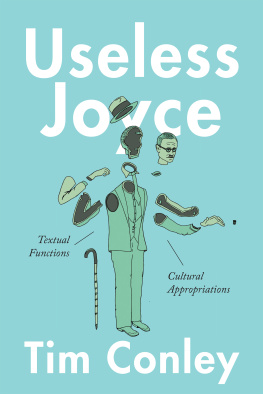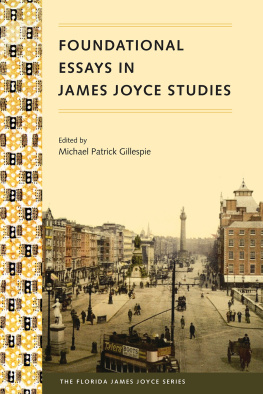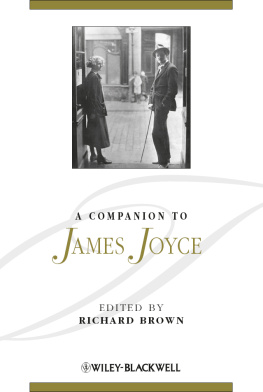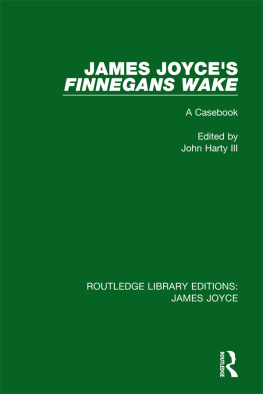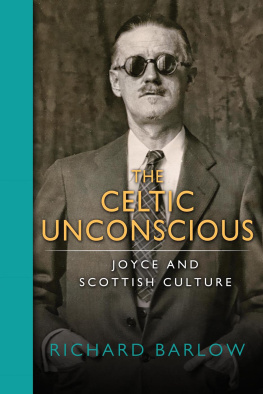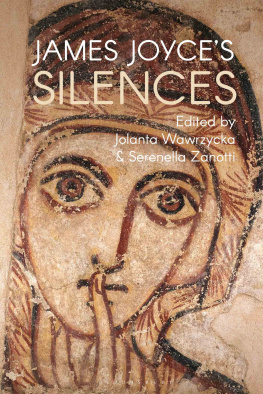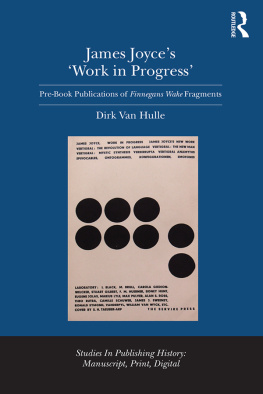USELESS JOYCE
TIM CONLEY
Useless Joyce
Textual Functions, Cultural Appropriations
UNIVERSITY OF TORONTO PRESS
Toronto Buffalo London
University of Toronto Press 2017
Toronto Buffalo London
www.utppublishing.com
Printed in Canada
ISBN 978-1-4875-0250-8 (cloth)

Printed on acid-free, 100% post-consumer recycled paper with vegetable-based inks.
Library and Archives Canada Cataloguing in Publication
Conley, Tim, 1972, author
Useless Joyce : textual functions, cultural appropriations / Tim Conley.
Includes bibliographical references and index.
ISBN 978-1-4875-0250-8 (cloth)
1. Joyce, James, 18821941 Criticism and interpretation. 2. Joyce, James, 18821941. Ulysses. 3. Joyce, James, 18821941. Finnegans wake. 4. Art and literature. I. Title.
PR6019.O9Z5275 2017 823.912 C2017-903064-7
University of Toronto Press acknowledges the financial assistance to its publishing program of the Canada Council for the Arts and the Ontario Arts Council, an agency of the Government of Ontario.

Acknowledgments
In Exiles, Bertha Rowan reproves her husband Richard: I am simply a tool for you (588). Joyce is, as I hope this book demonstrates, very aware of what uses he makes of people, words, and ideas, even if his gratitude seems less than overwhelming. Fair use is a funny phrase, a formula by which scholars can defend their adoptions of others work, and thus as much a legal fiction as paternity. I hope that I have made fair use of all named below.
Thanks first to various Joyceans from hither and yon, some of whom have thoughtfully discussed with me or carefully read some parts of this project, and some of whom have facilitated it in one way or another: Luca Crispi, Ronan Crowley, Anne Fogarty, Finn Fordham, Michael Groden, Terence Killeen, Sean Latham, John McCourt, Laura Pelaschiar, Fritz Senn, and Sam Slote. It is a privilege to count oneself in the company of these scholars. I am also appreciative of the support of my departmental colleagues at Brock University, a dynamic group with whom it is a pleasure to work. My students in Ulysses seminars and those in the Finnegans Wake reading groups I have organized (a verb that I doubt is apt) over the past several years have enriched my own ideas about those books and what we do with them. My research assistant Amber Halkes, a veteran of both of those environments, helped lay the foundations for the appendix of this book. Customary but always deserved and sincere thanks too to Stephen Cain.
Some chapters, or portions of them, have previously appeared, sometimes in slightly different forms, in scholarly journals and essay collections. Misquoting Joyce ( were presented as talks at the Joyce Symposium in Dublin and at the Joyce Summer School in Trieste, and I am grateful for the interest shown and the subsequent discussions produced by those audiences.
A grant from the Humanities Research Institute (HRI) at Brock University helped jolt this project into a comprehensible shape. A couple of months spent as James M. Flaherty Visiting Professor at Trinity College Dublin, thanks to a generous fellowship from the Ireland Canada University Foundation (ICUF), with the assistance of the Government of Canada, gave me time to see it through to its completion. I am grateful to James Kelly and Amanda Hopkins at the ICUF, to Chris Morash at the School of English at TCD, and for the hospitality and patient assistance of Sarah Barry at the Long Room Hub.
My editors at the University of Toronto Press, Richard Ratzlaff and Barb Porter, are as patient as they are professional. I also extend my thanks to the two anonymous readers for the press, whose perceptive suggestions and corrections improved this book.
The ongoing patience and support of Clelia and Simone has proved more than useful, but in ways and at such lengths as it is useless to try to count. My thanks and love to both.
Note on Abbreviations
The following citational abbreviations are used for works by Joyce:
| D | Dubliners |
| FW | Finnegans Wake (New York: Penguin, 1976) |
| FW-O | Finnegans Wake (Oxford UP; ed. Henkes, Bindervoet, and Fordham) |
| FW-R | Finnegans Wake: The Restored Edition (Penguin; ed. Rose and OHanlon) |
| FW-RH | Finnegans Wake: The Restored Edition (Houyhnhnm; ed. Rose and OHanlon) |
| P | A Portrait of the Artist as a Young Man |
| SH | Stephen Hero |
| U | Ulysses (ed. Gabler) |
The selection of Gablers edition of Ulysses (or indeed of any editions of Joyces works cited here) as primary reference should be understood as keeping with current scholarly convention, rather than as a critical endorsement of it over any other edition. Likewise the default text of Finnegans Wake here is distinguished from the most recent editions, which are themselves the subject of scrutiny in
USELESS JOYCE
To discover the various use of things is the work of history.
Karl Marx, Capital
Hands that can grasp, eyes
that can dilate, hair that can rise
if it must, these things are important not because a
high-sounding interpretation can be put upon them but because they are
useful.
Marianne Moore, Poetry
Clank it. Clank it. Miles of it unreeled. What becomes of it after? O, wrap up meat, parcels: various uses, thousand and one things.
James Joyce, Ulysses
Introduction
Let us, the real Us, all ignite in our prepurgatory grade as aposcals and be instrumental to utensilise (FW 446.36447.01)
At loose ends and unsure what to do with himself, Stephen Dedalus visits the dean of studies in the final chapter of A Portrait of the Artist as a Young Man. He finds the dean stooped before the fireplace, and Stephen asks, Can I help you? This question might surprise the reader a little, especially one who has read and been taught, again and again, that Stephen is a luciferian figure whose unfettered freedom and sovereignty are extolled with the decree non serviam. Helpful is probably not an adjective that most readers would attach to Stephen. It might also seem that it should be the dean who asks this question of the student who (to all appearances) comes to consult him, much in the way that the rector of Clongowes solicitously receives Stephen in his study in a parallel scene years before, in the first chapter of the novel. Declining the offer, the dean proposes a distinction between the liberal arts and the useful arts and lights the fire himself, an operation which Joyce depicts in slow technical detail:
Not too much coal, said the dean, working briskly at his task, that is one of the secrets.
He produced four candle-butts from the side-pockets of his soutane and placed them deftly among the coals and twisted papers. Stephen watched him in silence. Kneeling thus on the flagstone to kindle the fire and busied with the disposition of his wisps of paper and candle-butts he seemed more than ever a humble server making ready the place of sacrifice in an empty temple, a levite of the Lord. Like a levites robe of plain linen the faded worn soutane draped the kneeling figure of one whom the canonicals or the bell-bordered ephod would irk and trouble. His very body had waxed old in lowly service of the Lord in tending the fire upon the altar, in bearing tidings secretly, in waiting upon worldlings, in striking swiftly when bidden and yet had remained ungraced by aught of saintly or of prelatic beauty. (

